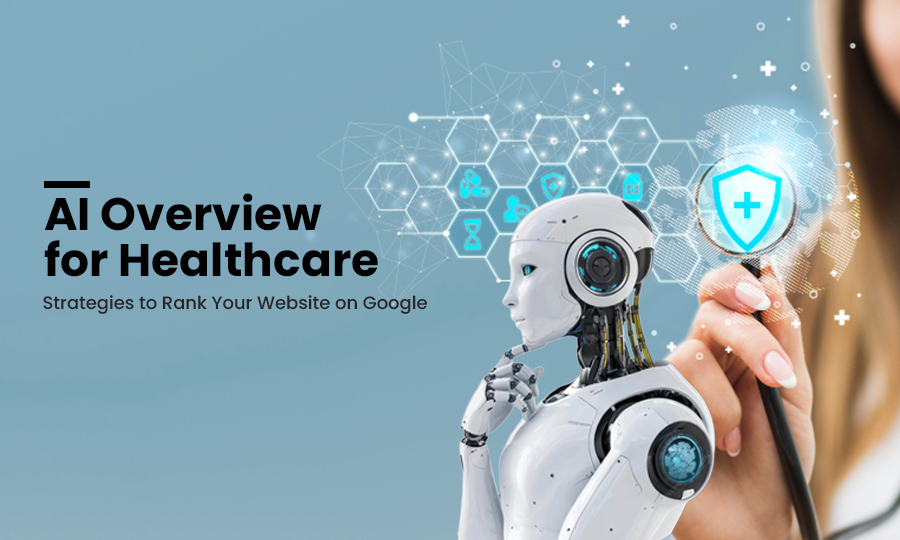For years, SEO meant ranking pages at the top of the search engines. But it is not the same anymore. With the evolution of AI in healthcare, nowadays, when people search for something on the Internet, they are welcomed by Google AI overviews. According to research by AIOSEO, 63% of businesses have reported that Google AI overviews have positively impacted visibility, organic traffic, or rankings.
This feature showcases Google’s auto-generated summaries that appear right above the traditional search results. As these answers pop up first, get seen first, and are tapped on first, many healthcare professionals are now aiming to get their content ranked in the overviews in order to get noticed by their target patients more easily.
But getting into the AI spotlight is quite a task. This comprehensive guide will show you exactly how. It will tell you what Google’s overviews are, how they work, a step-by-step guide to ranking in AI overviews, types of content that work well in Google overviews, tools and techniques, and more. So, let’s dive in.
What are Google AI Overviews and How Do They Work
Google AI overviews are brief, AI-generated summaries that often appear at the top of the Google search results. They provide users with immediate answers to their queries by gathering information from multiple high-ranking websites.
These summaries are powered by Large Language Models (LLMs) and aim to answer complex queries without having users click on separate links to find what they are looking for.
AI Overviews are often considered similar to featured snippets, as both deliver direct answers to users’ queries within the SERP and depend on content from high-ranking websites. But the technology behind AI overviews is what sets them apart.
Google’s AI overviews leverage generative AI to deliver quick and tailored answers to queries at the top of search results, collecting data from multiple high-quality Internet sources, the Knowledge Graph, and user-generated content.
How Google Chooses Sources for AI Overviews?
Now that you have a clear idea of what AI overviews are and how they work, it is time for us to discuss how Google chooses its sources for AI overviews.
With the emergence of AI in healthcare, Google has also adopted AI in the form of AI Overviews. Ranking in these AI-generated summaries can not only enhance brand visibility but also help healthcare professionals to gain the attention of their patients. So, we have decided on some sources that Google likely uses to display on AI Overviews.
- Authority and Credibility: Relevant backlinks, strong domain authority, and consistent reputation.
- Variety of Perspectives: Google suggests that healthcare providers cite multiple sources to offer balance.
- Relevance and Clarity: Healthcare practices must develop content that answers queries directly as well as corresponds to search intent.
- E-E-A-T: Healthcare providers need to create valuable content that highlights first-hand experiences and expertise.
- Freshness: Updated and timely content is most likely to get cited. Organized Formatting: Well-structured pages with prominent sections and headings are easier for AI to process.
Why AI Overviews Matter for Healthcare Websites
With the evolution of Artificial Intelligence in healthcare, hospitals, clinics, and doctors must make sure they do not lag behind.
AI overview heavily matters in healthcare as it acts as a significant “position zero” placement that can contribute to enhancing visibility and position your website as an authority for sensitive YMYL Content, by focusing on sites that showcase exceptional Experience, Expertise, Authority, and Trustworthiness.
Now, let us see why it is crucial to rank healthcare websites in Google AI Overviews.
- Fosters Authority: Content featured in an AI Overview is often considered a credible and primary source, which helps foster trust and develop a healthcare website as an expert in the healthcare field.
- Establishes Patient Trust: Patients on Your-Money-Your-Life (YMYL) topics often depend on accuracy and authority to make informed health decisions. By being featured in the AI Overview, healthcare practices can not only show patients that their content is reliable but also build trust and loyalty among them.
- Position Zero Visibility: AI Overviews appear at the top of the search engine pages. Making your website or content rank on Google’s AI Overviews can make your content more easily accessible to patients who are looking for healthcare information online, even before they scroll down to traditional search results.
- Awards E-E-A-T: Google’s AI overviews are specially designed to gather information from high-ranking pages. By developing credible, valuable, and EEAT-friendly content, healthcare providers can make their website get selected and cited by Google’s AI Overview.
What are the Challenges of AI Overviews?
Every coin has two sides. You want to rank your healthcare website in AI search? Here are certain challenges of AI overviews that you must consider.
- Accuracy:
Generative AI often “Hallucinates.” This means they create fake information and misinterpret questions, providing inaccurate health-related details that might put patients’ health at risk.
When AI overviews provide inaccurate or generalized medical information, it can erode public trust in online health resources or even lead to misinformed health decisions.
- Content and Attributions:
AI-generated summaries that are too brief and often lack proper source citations and well-defined explanations, making it hard for patients to understand complex medical concepts and what they should do next.
- Biased Information:
AI models are often trained on biased data that can actually worsen or perpetuate health disparities of patients, leading to major issues.
- Alogithmetic Opacity:
The “Black Box” nature of AI overviews makes it difficult to understand how certain health information is generated, hampering trust and accountability.
- Lack of Personalization:
AI Overviews may not offer the level of personalization that a human-written article or blog offers. The major challenge of leveraging AI in healthcare is that it does not offer the empathetic and personal touch that a human healthcare practitioner can offer.
Best Practices for Medical Practices to Rank in Google’s AI Overviews
With Google collecting content from multiple web sources and summarizing it at the top of the search results, it is getting more and more difficult for healthcare brands to get noticed by their target audience.
Want to get your content ranked at AI overviews? By following this step-by-step guide, you can optimize your content to appear in the AI overviews.
- Add E-E-A-T Signals
Google algorithms are getting smarter at evaluating the quality and credibility of content. This is where E-E-A-T signals come into play. EEAT stands for Experience, Expertise, Authoritativeness, and Trustworthiness. In fact, Google’s AI overviews are heavily impacted by content that showcases verifiable expertise and real-life experience.
How to Add E-E-A-T Signals in Your Content?
Share Real-life Examples: Healthcare professionals must tell stories or show real-life examples from their own experience. For example, if you are writing about orthopedics, you should share a story of how you have performed a successful orthopedic treatment.
- Describe Yourself: Include a brief bio about yourself or the author who is developing the content for your healthcare business, showcasing your expertise and skills. This will help Google view you as an expert.
- Include Trust Signals: Add elements such as reviews from satisfied patients, mentions in other trusted articles, or links to relevant studies to support your claims. These tell Google and its AI that your healthcare practice is reliable and authoritative.
- Leverage Verified Credentials of Real Medical Professionals
Another best way to rank in the AI overviews is, healthcare practices must showcase E-E-A-T by adding bios and qualifications of your staff, relevant affiliations, and experience of the content authors.
- Enhance Author Credibility:
Even if a healthcare professional is not writing the content for your healthcare professionals and you are outsourcing it, you must make sure to get it thoroughly checked by a professional who has in-depth knowledge of that particular topic.
For instance, if you are writing a blog post or article on skin conditions, you must get it checked by an experienced dermatologist in your organization.
If your content is being developed in-house by professionals, you must properly list the author’s relevant certifications, professional affiliations, or board membership. Furthermore, you must also provide clickable links to their published works, external professional profiles, or other relevant achievements to back their credibility.
- Establish Trust and Authority:
To achieve patient trust and gain credibility, healthcare professionals must link to reputable sources such as the World Health Organization or NIH to support their information. They can also develop a detailed “About Us” page that is specifically dedicated to showcasing their organization’s years of expertise, clinical leadership, and overall experience.
As the healthcare industry keeps evolving, healthcare professionals must keep their website content up-to-date. Regularly audit and refresh your content to make sure all information remains current and accurate.
- Optimize and Structure Content for AI:
To rank in Google AI overviews, medical practices must use clear lists, headings, and an organized section to make their content easier for AI to understand and parse.
Moreover, healthcare providers must implement schema markup that can offer clear and structured data about their authors and content that AI systems often prefer.
By prioritizing developing comprehensive, valuable, and informative content that directly solves the queries of the patients and satisfies search intent, rather than just matching keywords.
- Include Citations and Medical Reviewers
According to SuferSEO, Google cites up to eight sources in AIOs 90% of the time. It gathers content from various pages to develop a clear summary that is still relevant to a user’s query.
While it is best if your website is considered credible enough to be cited, linking to other authoritative sources can also be a great way. Doing so means your data is properly supported by a resource that Google considers reputable. This enhances the likelihood of your content being used in the AI overview.
How can Healthcare Practices Include Citations in their Website Content?
- Cite Reputable Sites: As a healthcare provider, all your claims must be supported with relevant citations to credible sources, such as government health organizations (e.g., Mayo Clinic and NHI) or scholarly journals.
- Showcase Expertise: Display the expertise of your medical reviewers and authors through comprehensive bios that include their certifications, credentials, and professional experience in the related medical sector.
- Highlight Authoritativeness: Healthcare businesses must offer clear authorship with properly arranged information and professional profiles using schema markup to help Google verify your expertise.
- Produce Unique Data: Healthcare delivery practices must generate organic and well-researched content that provides unique perspectives and answers unique patient queries.
- Optimize About and Contact Pages
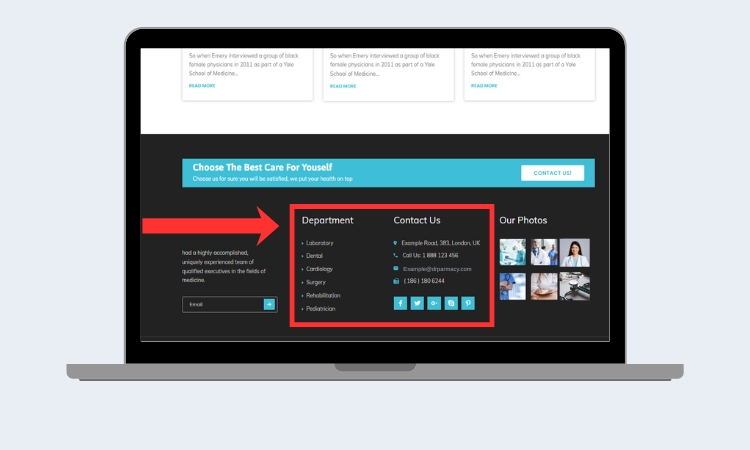
Website pages are another factor that can help rank on AI overviews. In order to rank in the AI overview, healthcare professionals must structure their “About Us” and “Contact Pages” to be clear, authoritative, and answer specific patient queries using Answer Engine Optimization (AEO).
- Strategies for About Us Page:
- Authoritative Content: Develop detailed content about your practice’s services, history, and unique value proposition (USPs).
- Structured Data: Incorporate schema markup to help AI easily determine your information, including specific services offered, the expertise of practitioners, and conditions treated.
- Citations: Healthcare practices must cite industry-relevant and credible sources to foster trust and authority.
- Multi-Modal Content: Include videos, images, and infographics with descriptive alt text and metadata to offer a better user experience.
- Implement Local Keywords: To effectively optimize your contact pages, you must implement local keywords such as “emergency healthcare services,” “best healthcare clinic in [City],” or “best healthcare clinic near me.” These can help healthcare practices appear in local searches.
- Strategies for Contact Us Pages:
- Optimize for Local SEO: Healthcare practices must optimize for local intent by guaranteeing that their Google Business Profile is accurate and up-to-date.
- Provide Clear Contact Information: Provide relevant and transparent contact information, like phone number, hours of operation, and clinic address. Healthcare practices must make sure the contact information they are providing is easy to read so that AI can easily parse it.
- Provide Direct Answers: Start sections of your contact pages with short answers to common queries, such as “Where are you located?” or “What are your working hours?”
- Create AI-Friendly Content Structures
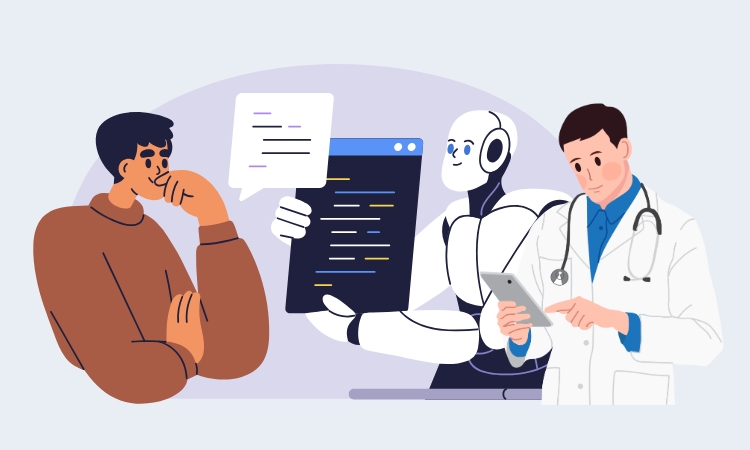
With the increasing popularity of AI in healthcare, practices need to create AI-friendly content structures in order to rank in Google’s AIOs. So, this section of the blog will provide information on how you can create AI-friendly content structures to make your content appear on AIOs.
- Start with a Direct and fact-driven summary
Clinical practices must place the most crucial data, information, and answers to patients’ queries at the very beginning of their content.
To make it easier for AI to read your content, healthcare practices must implement unambiguous language to convey facts rather than using vague terms.
- Use Bullet Points and Clear Subheadings
Break up your content with clear headings and subheadings to help AI easily identify and categorize different sections of your content. Healthcare practices can also use bullet points to provide key takeaways in a short and easy-to-digest manner.
- Match the Question Format to User Search Intent
Healthcare professionals must structure their content in a question-and-answer format to match how patients phrase their queries, making it easier for AI to match content to search intent. For instance, healthcare professionals can add questions like “What is Prediabetes?” to meet the search intent of patients.
- Leverage Schema Markup
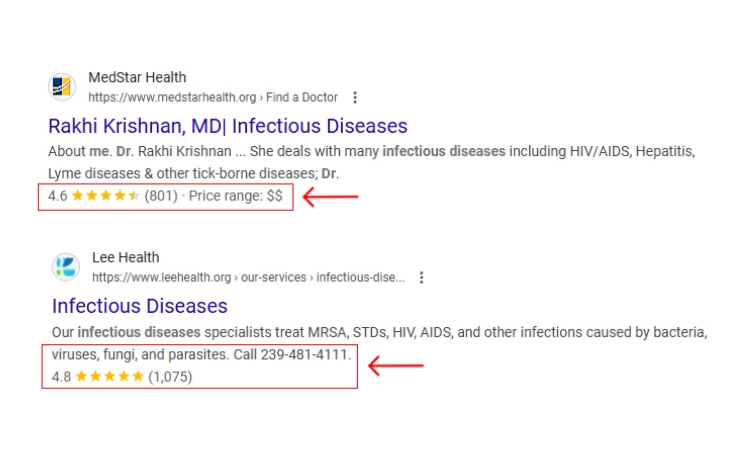
Every business wants its content to stand out, so do you, right? Schema markup can be a great help in this case. These elements help Google identify and understand your content better, increasing the chances of your website being featured in AI overviews.
Schema Markup perfectly organizes and tags information on your website in a way that is easily understandable by search engines. It offers Google a roadmap to your content to determine exactly what is on the page.
For example, if you are publishing an article about a particular treatment, schema markup can help Google recognize details such as keywords, published date, article category, and author information.
Here is how healthcare systems can leverage specific schema types to rank their content on Google’s AI overviews.
- MedicalCondition Schema: Healthcare providers can use this schema if their content discusses a specific medical condition. Using the MedicalConditions schema can allow medical practices to clearly define details such as causes, symptoms, and the treatment process of a medical condition. This provides the AI with structured data to employ when generating health-related summaries.
- MedicalWebPage Schema: This schema can be implemented for a single-topic web page discussing a medical topic. The MedicalWebPage schema can be implemented to signify the page’s medical nature and offer context for its content, such as the target audience or the medical condition it discusses.
- FAQPage Schema: Including the FAQPage schema for frequently asked questions sections directly provides question-and-answer pairs to Google. This is very effective to rank on AI overviews, as it can directly pull the answers from your FAQ sections to resolve the queries of users, possibly appearing in rich snippets with collapsible boxes.
- Author Schema: Using the Article schema with author properties can help healthcare professionals establish practice credibility as well as showcase the expertise of the content creator. This is important for Google’s E-E-A-T (Expertise, Experience, Authority, Trustworthiness) signals, which are highly preferred by AI Overviews.
- Review Schema: For content that includes reviews of products or services, the Review schema allows healthcare providers to showcase star ratings and other review details directly on search results. This can enhance click-through rates and signal to AI the patient sentiment and quality of care associated with the content.
- Breadcrumb Schema: This type of schema helps Google determine the hierarchical structure of your medical website, offering clear navigation paths. This not only enhances patient experience but also helps the AI understand the context of a particular page within the overall structure of your website.
How does Schema Markup Help Google’s AI?
Schema markup, also known as structured data, plays a crucial role in helping Google’s AI overviews identify and use your content. Let’s discuss some of the importance of Schema Markup to rank on Google’s AI overviews in detail.
- Information Extraction: AI models like Google’s Gemini can more easily pull specific pieces of information when presented in a structured format.
- Semantic Understanding: Schema Markup provides a clear semantic meaning to your content, going beyond just keyword matching to an in-depth understanding of topics.
- Trust and Credibility: Schema associated with authorship and reviews heavily contributes to E-E-A-T signals, which are essential for content to be considered credible and trustworthy by the AI.
- Rich Results and Higher Visibility: If implemented correctly, schema can lead to rich results in traditional search as well as increase the possibility of content being cited or summarized in AI overviews.
Why Schema Markup Matters in AI Overview?
Here is how schema markup is vital for an AI overview:
- Extract step-by-step instructions
- Read Product Details
- Understand answers to common patient queries
- Highlight crucial facts and features.
Schema Markup can be generally implemented using JSON-LD, which is valued by Google. Healthcare professionals can also manually incorporate JSON-LD scripts into their page’s HTML plugins and tools to create and manage schema markup. After incorporation, healthcare providers can use Google’s Rich Results Testing Tool to confirm their schema and make sure it is implemented correctly.
In case you are just starting out and find all of this a little too overwhelming, you can perhaps seek professional healthcare marketing services that specialize in implementing AI in healthcare.
- Leverage First-Hand Experience
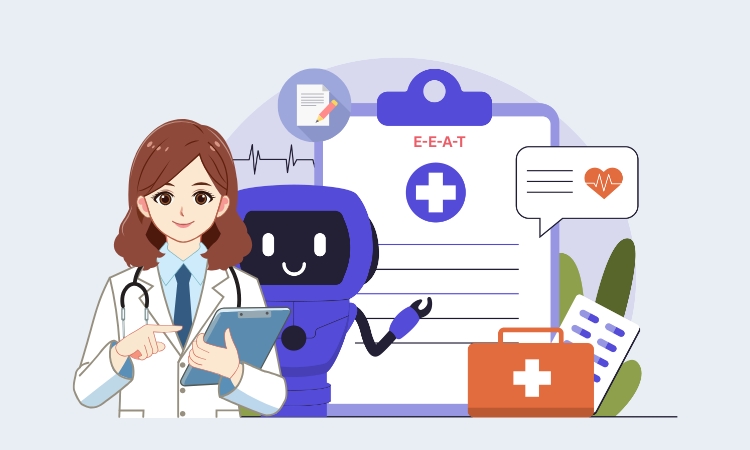
As we have discussed earlier, Google’s AI search results have become exceptionally good at understanding content that showcases all four traits: Experience, Expertise, Authoritativeness, and Trustworthiness. These signals are very important for AI overviews, which aim to deliver reliable information.
How can healthcare professionals strengthen E-E-A-T signals in their content?
- Include author bios with relevant credentials.
- Share personal experiences and expertise.
- Connect to credible external sources.
- Cite relevant statistics from research and studies.
- Keep content up-to-date to maintain accuracy.
- Include patient success stories, case studies, or doctor commentary.
- Add practical advice backed by relevant professional experience.
For example, healthcare professionals can use phrases such as “With over 15 years of experience in the healthcare industry” or “board-certified dermatologist” that signal real-world expertise that AI can identify.
- Optimize for Featured Snippets
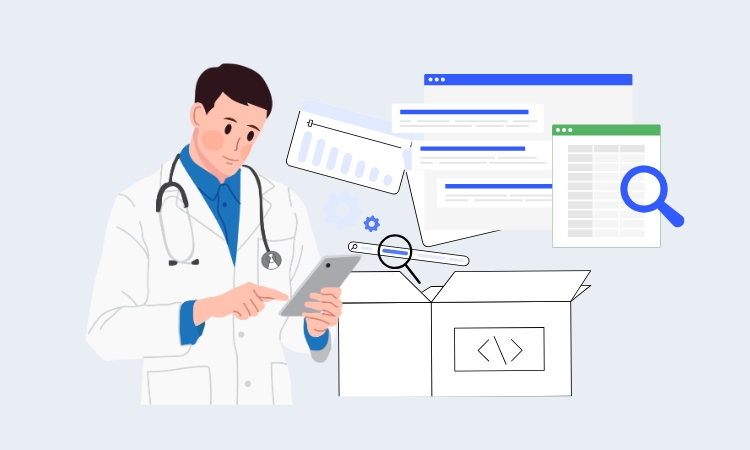
In order to optimize for featured snippets, healthcare professionals must create snippet-style content. But how? In this section, we will discuss what featured snippets are and how healthcare practices can optimize their website for featured snippets.
What are Featured Snippets?
A featured snippet is a direct, at-a-glance answer to a search query that appears right at the top of Google’s search results pages, often in a highlighted box, known as “Zero Position.”
It offers a short summary, list, definition, or table extracted from a top-ranking webpage, offering users an instant response before they click to visit the original website to get further details.
How can Healthcare Organizations Optimize their Website for Featured Snippets?
- Answer Questions Directly
Google highly prioritizes content that clearly and directly answers user queries.
- Front-load your answers: Healthcare leaders must start sections with direct answers in the first 40-60 words, then add supporting details in the rest of the text.
- Create dedicated FAQ sections: FAQ sections are a crucial feature of a medical website. Healthcare practices must incorporate a dedicated “Frequently Asked Questions” section on their service page or blog section. They can get these question ideas from “People Also Ask” questions that often appear in Google’s search results for your relevant keywords and use them to develop your FAQs.
- Target question-based keywords: Healthcare practices must focus on incorporating long-tail and conversational queries that patients are actually searching for. For example, an oncologist can target keywords such as “how to cure breast cancer,” while a physiotherapist can target keywords such as “best physiotherapist for back pain in Germany.”
- Include Clear Medical Summaries
After a direct answer, healthcare practices must provide a detailed but easy-to-understand summary. This builds on the initial answer and offers complete information, valuable to both search engines as well as users.
- Establish E-E-A-T signal: Since Google holds medical (YMYL or “Your Money, Your Life”) content to a higher standard, clearly feature the author’s experience, credentials, and certifications. Healthcare professionals must include a bio, image, and links to other verified work.
- Cite sources: Healthcare practices must make sure all factual and clinical claims are backed up by referencing credible and reputable sources such as government health agencies, medical journals, and medical associations.
- Incorporate a medical disclaimer: In the healthcare industry, it is a best practice to add disclaimers to your content, stating that it is for educational purposes only and not an alternative to professional medical advice.
- Implement Tables and Lists
Oftentimes, AI extracts information for AI overviews and featured snippets from well-organized and formatted tables and lists. Which is why it is crucial for healthcare professionals to,
- Organize information with lists: Healthcare providers must use bullet points for unstructured lists of benefits and symptoms, and numbered lists for step-by-step guides. For instance, a list is suitable for outlining the steps of a medical procedure.
- Implement tables and comparative data: Tables are very helpful for displaying comparative information, such as medication dosages, treatment options, or insurance plans. Incorporate real HTML tables instead of embedded images to make it easy for AI to parse them.
- Keep Content Fresh & Factually Accurate
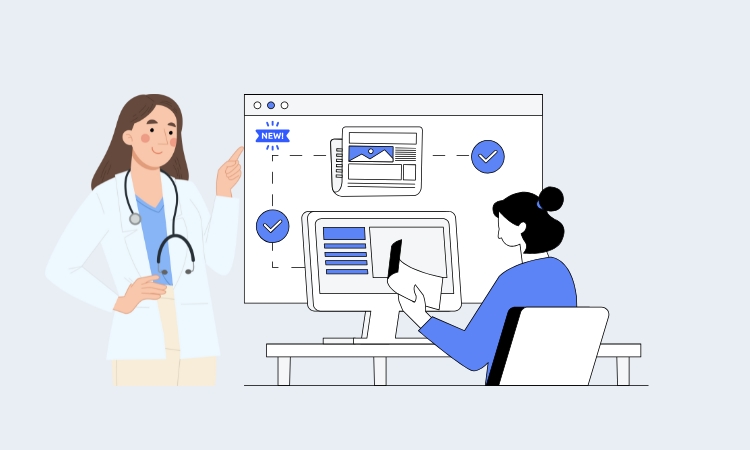
Google extracts content from various pages to create a brief summary that still offers a complete and easily comprehensible answer to patients’ queries. In order to rank your healthcare content in Google’s AI Overviews, it is crucial to keep your content up-to-date and factually correct. To do this, here are certain things you must do as a healthcare practice.
- Cite Recent Research and Sources
While it is great if your website is considered authoritative enough, healthcare practices can also link to other authoritative sites, such as Mayo Clinic and CDC, to rank on Google’s AIOs.
Providing relevant citations and links to authoritative sources, such as government health organizations and medical institutions, means that your information is backed by a reputable resource that Google considers relevant and reliable, ultimately increasing the chances of your content being utilized in Google’s AI Overviews.
- Update Outdated Content Regularly
Outdated information can heavily mislead users, and Google does not want that. So, in order to rank your content in Google’s AIOs, healthcare providers must keep their website content and information updated by replacing outdated statistics and adding new information based on trending topics.
- Include “Last Updated” Dates Visibly
Another crucial aspect to keep your website content updated is by updating the “Last Modified” or “Last Updated” date whenever you make notable changes to make Google believe that your content is fresh and up-to-date.
Why Updating Your Content is Crucial?
Search engines like Google prioritize fresh content because of the following reasons:
- User preferences have changed: Users always look for the latest data, and not for advice or information from previous years.
- AI systems value relevance: Outdated information often lacks current context. On the other hand, AI systems highly value relevance, reducing the chances of outdated content getting ranked on Google’s AIOs.
- Google uses freshness signals: Google leverages freshness signals, such as revised links or timestamps, to determine which pages are the most relevant for AI-generated summaries.
- Mobile UX & Technical SEO
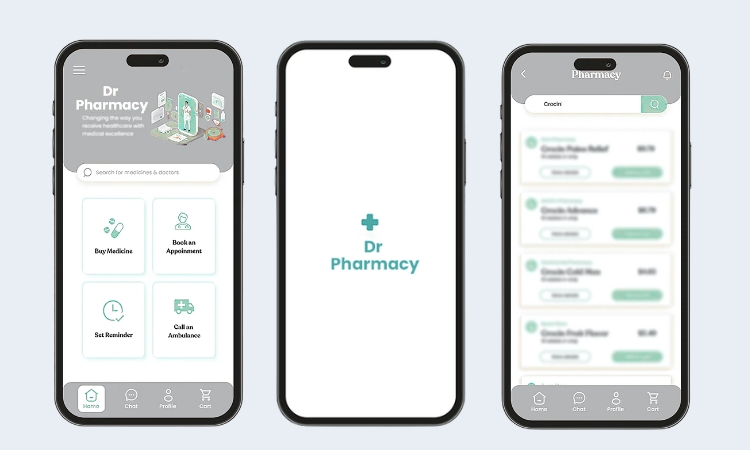
With the increasing importance of AI in healthcare, here is another best practice that can help healthcare practices rank on Google’s AI-generated summaries, designing your medical website for Mobile UX, and focusing on technical SEO.
So, here are a few things healthcare practices must focus on in order to rank their content in the AI Overviews.
- Fast-loading and clean design: Healthcare practices must improve their core vitals, reduce their loading speed, and guarantee a user-friendly and uncluttered design on mobile devices.
- Security (HTTPS): Medical professionals must implement HTTPS to secure their website, which is a basic ranking signal.
- Mobile Responsiveness: With around 62.54% of global web traffic coming from mobile devices, mobile responsiveness has become a crucial aspect. Even Google itself prioritizes mobile-first indexing. This is why healthcare practices must design their site to be completely responsive across mobile devices, ensuring a seamless patient experience.
- Accessibility standards: Healthcare providers must strictly follow accessibility guidelines, which are specifically important for the healthcare sector. This guarantees that everyone can access your content.
Content Types That Rank Higher in AI Systems and Google’s AI Overviews
As Google’s AI Overviews continues to evolve, one major concern rises in the minds of content marketers or businesses: what type of query actually triggers them? The answer is very important, especially as AI Overviews are taking over search results and often rank even above traditional searches.
New patterns are emerging. A large number of AI overviews show up for informational queries. These are the types of searches where patients are looking for explanations, definitions, and comparisons. For example, searches like “What is anemia?” or “What are some best diabetes treatments?” are likely to generate AI overviews more frequently than short and brand-oriented queries.
Some other common traits include comparisons such as “Type 1 diabetes vs Type 2 diabetes,” preventive care guides such as “How can I quit smoking?” and symptom checklists such as “How often do you experience fatigue?”
Real Examples
Websites like Cleveland and Healthline clinics often appear in Google’s AI Overviews. How? Let’s take a detailed look at it.
- Content Format:
- Organized and Comprehensible: Articles are divided into clear sections with prominent headings, subheadings, bullet points, and brief paragraphs, making them easier to read and comprehend.
- Expert Authorship: Website content is often written or reviewed by medical professionals, such as doctors and nurses, which fosters trust and authority.
- Design: Graphics, videos, and images are leveraged to explain complicated topics, enhancing comprehension and engagement.
- Credible but Accessible: The tone of the content of these clinics is professional yet informative, showcasing expertise without being too technical or domineering.
- Supportive and Empathetic: Specifically for health-related content, the tone they add often aims to understand the user’s needs and preferences and offer valuable guidance.
- Clear and Crisp: Medical terms are often used less, and if used, are explained clearly to make sure that the information is easily understandable to a broader audience.
- Credibility:
- E-E-A-T: These sites showcase strong E-E-A-T by highlighting the credentials of their authors and maintaining a constant focus on offering reliable healthcare information.
- Authoritative Content: In these websites, information is often backed by scientific research, studies, and clinical evidence, which are often cited to support claims.
- Regular Updation: Content is updated to reflect the latest medical information and practices, guaranteeing its continued relevance and accuracy.
- Transparent Disclaimers: These websites often have transparent guidelines and disclaimers, giving them their professional and credible nature.
Tools and Techniques to Monitor Your Visibility in AI Overview
Monitoring visibility on Google’s AI Overviews often requires adapting certain tools and techniques. In this section of the blog, we have discussed a few of them.
- Google Search Console
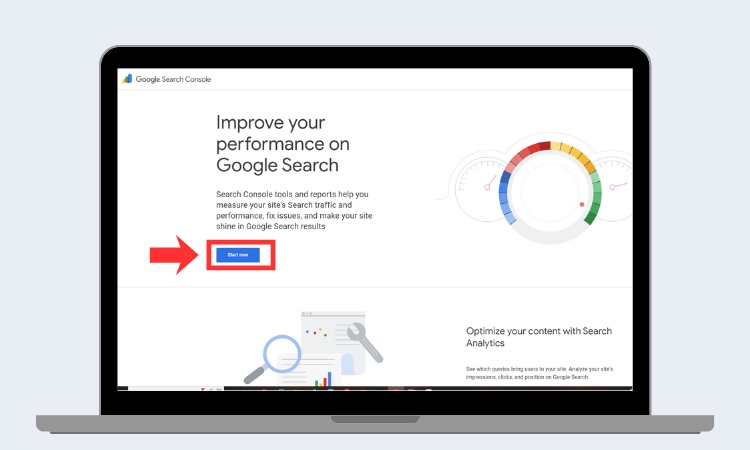
Google Search Console can be very effective in tracking AI-affected queries. Here are a few steps on how healthcare professionals can do it.
- Navigate to Google Search Console and click on “Start now.”
- When logged in, healthcare providers need to navigate to the “Performance” section.
- At the top of the filter options, click on “Search appearance.”
- From the dropdown menu, healthcare professionals need to choose the “AI Overview” to see al;l the data related to your page’s performance within Google’s AI summaries. These data include queries that trigger AI responses, pages that feature AI-generated results, and corresponding impressions, clicks, and average position.
- Google Analytics
With the evolving influence of AI in healthcare, doctors and healthcare specialists can implement tools like Google Analytics to identify high-performing medical topics. Let us discuss the steps on how healthcare providers can implement Google Analytics to determine well-performing medical topics in detail.
- Monitor website content performance: Implement Google Analytics to monitor which articles, blog posts, and educational resources on your website receive the most traffic.
- Evaluate patient engagement: Healthcare organizations must observe metrics such as the amount of time visitors are spending on a page and how many pages they are visiting. Higher engagement signifies that a topic is performing well.
- Track topic trends: Leverage the data to identify which health conditions or topics are generating the most user interest.
- Determine patient behaviour: Google Analytics’ machine learning can help healthcare professionals understand the entire patient journey, allowing them to determine how patients navigate and interact with content that is related to particular medical topics.
- Identify high-interest: Geo-targeted campaigns can reveal which geographic areas have the highest demand for certain healthcare services, which can also be associated with specific medical topics.
- Schema.org Validator
Monitoring your schema markup using the Rich Results Test and Schema.org validator involves a two-sided approach.
Leveraging Google’s Rich Results Test:
This tool especially checks if your structured data is suitable for Google’s Rich Results (e.g., FAQs, product snippets, and star ratings) and offers a preview of how they might appear in the Google search.
Steps to Use:
- Healthcare professionals need to navigate to Google’s Rich Results Test Tool.
- Now they need to enter the URL of the page that they wish to test or directly paste the structured data code.
- After that, healthcare professionals need to click on “Test URL” or “Test Code.”
- Now it is time to review the results. This tool will show whether or not your structured data is valid for rich results and pinpoint any warnings or errors that need to be corrected. It also offers a visual preview of prospective rich results.
Using the Schema Markup Validator:
This tool is provided by Schema.org and validates all types of Schema.org-based structured data, regardless of whether it is eligible for Google’s Rich Results. The Schema Markup Validator guarantees that your markup strictly adheres to the Schema.org vocabulary.
Steps to Use:
- To start the process, healthcare professionals must first navigate to the Schema Markup Validator.
- Now, enter the URL of the page you wish to test or paste the structured data code.
- And then click on “Run Test.”
- The validator will identify any syntax errors, missing required properties, or any other issues within your Schema.org markup.
Basically, healthcare practices must use the Rich Results Test to check for Google-specific rich result eligibility and preview. On the other hand, if a healthcare marketer wishes to get complete validation of their Schema.org markup against the official vocabulary, this guarantees its right implementation and accuracy.
Common Mistakes Healthcare Professionals Must Avoid When Optimizing Their Website to Rank on Google’s AIOs
With the rising popularity of healthcare AI, many healthcare professionals fail to make a strong online presence due as they are implementing traditional practices to rank. To successfully rank your website on Google’s AI Overviews, here are some common mistakes you must avoid.
- Too Brief or Overly Technical Content
Content that is too brief, filled with complicated medical terms, and lacks depth might fail to answer the queries of the patients or captivate their attention, leading to a higher bounce rate and dropped rankings.
In order to avoid this, healthcare professionals must develop semantically complete content that offers comprehensive solutions to patients’ questions and covers related topics, rather than over-optimizing their website content for exact-match keywords.
- Not citing trustworthy sources
Content without credible sources can be considered unreliable, hampering a website’s authority and relevance in search results.
Healthcare professionals must back up their information with citations from trustworthy and credible sources to establish credibility and trust among both patients and search engines.
- Ignoring schema and structured data
Ignoring structured data or schema can make it even harder for search engines to understand the content of your pages, possibly reducing visibility.
Incorporate schema markup to offer search engines the complete context about your content, helping them to better understand and read your pages.
- Using Generic AI Content Without Expert Review
The implementation of AI in healthcare is increasing, and with this, more and more people are using it to create content for their businesses. However, generic AI-generated content often lacks subtlety, depth, and accuracy, for medical information can hurt your website’s authority and patient trust.
In order to avoid this, healthcare providers must use AI tools, but always make sure their medical experts review it and edit AI-generated content. This can guarantee the relevance and quality before publishing.
Future-Proofing Your Healthcare SEO with Artificial Intelligence
Google AI SEO for medical websites is crucial for achieving success in the rapidly changing healthcare sector. The constantly evolving technology affects every marketing strategy, including Content Marketing and AI Search Engine Optimization for doctors.
AI-generated SEO has the potential to yield exceptional results, working with accuracy and efficiency that no human marketing team could achieve without a little push from advanced technologies.
AI-powered SEO is an optimization strategy driven by Artificial Intelligence. AI is used to optimize web pages in order to achieve higher rankings in search engine results. AI tools can help healthcare professionals by analyzing medical articles and patient forums to identify the most critical questions and concerns that are related to particular treatments and conditions.
Here are a few ways in which businesses can future-proof their healthcare SEO with AI.
- Build Brand Authority and Trust Across the Web:
Topical authority refers to your expertise in a particular subject, based on how thoroughly your website covers the topic. A healthcare business that publishes a handful of random pages about healthy eating does not include as much topical authority as one with sections especially dedicated to plant-based diets, meal-planning, and nutrition for various stages of life.
How to Showcase Topical Authority:
Topical authority requires a careful approach. Healthcare providers need to publish their content in an organized manner so that the AI systems understand where their expertise lies.
- Implement a content cluster approach: Healthcare practices must start with a few core topics that are crucial for your business. An orthopedic website might create clusters about joint diseases, joint replacements, and joint pain treatments for athletes.
- Expand each cluster: Develop a pillar page with relevant links to supporting pieces. A topic cluster about acne treatment can include articles about diet and lifestyle, prevention, basic skincare, and treatments.
- Publish informative content: Healthcare professionals need to take time and create well-researched content with useful insights. They must cite reputable sources and use recent studies and data to back up every piece.
- Incorporate internal links: Link to and from the pillar page, supporting pages, and between the pages in the cluster. This will help healthcare practices create a solid, interlinked bundle of content, indicating to search engines that the content belongs together and that you have a good expertise in the topic.
- Encourage Third-Party Citations
To future-proof healthcare SEO using AI in healthcare and encourage third-party citations, healthcare practices must:
- Write both for AI and People: Healthcare practices must focus on user search intent by offering clear and quick answers in an easier way, as AI systems value content that directly addresses patient needs.
- Implement structured data: Incorporate schema markup for Step-by-step guides, FAQs, and MedicalCondition pages to make it easier for AI overviews to identify and cite your content, enhancing visibility.
- Optimize for conversational search: Develop content such as Q&A formats and incorporate short, expert-reviewed paragraphs to make your information easily discoverable in AI-generated summaries.
- Maintain human oversight: Healthcare professionals must thoroughly fact-check all AI-generated content to avoid the spread of misinformation and ensure accuracy.
How to Encourage Third-Party Citations:
- Build authority: Healthcare systems must focus on creating high-quality and valuable content that other medical authorities would like to link with.
- Guest Posting: Contribute expert articles to other reputable medical websites and publications to earn backlinks.
- Develop Shareable Resources: Healthcare practices must thoroughly research summaries, develop infographics, and patient guides that other organizations will find useful and naturally want to link to.
- Participate in Research: Healthcare professionals must collaborate on research projects and studies that will be cited by other medical websites.
- Get Listed in Medical Directories: Make sure your healthcare practice is included in relevant and specialty-specific online directories.
- Monitor Backlinks: Healthcare professionals must regularly audit their backlink profile and eliminate or disavow harmful or low-quality links that could possibly hurt their practice’s reputation as well as SEO.
- Prepare for More AI and Voice Search Integration
Healthcare practices must prepare for more AI and Voice Search Integration to achieve SEO success. Here are a few ways you can do it.
- Personalization: Implement AI to analyze user intent and create tailored content that meets individual patient demand, enhancing patient engagement.
- Keyword Research: Healthcare practices must utilize AI-powered tools for effective and efficient keyword analysis to identify high-performing keywords and optimize content strategies.
- Content Generation: Leverage AI to generate content that perfectly aligns with search engine algorithms and is properly optimized for common patient queries, making it easier to adapt for voice searches.
The rise of AI and voice search optimization means that businesses must constantly adapt. Conversational searches are becoming more dominant. In this case, modifying content and SEO strategies will be essential for long-term success.
Conclusion
AI in healthcare is becoming more and more crucial with the rapidly growing healthcare industry. In recent years, Google’s AI Overviews has improved the process of search, but the mission for healthcare professionals remains the same: offering top-notch patient care to achieve the best patient outcomes. However, offering the best patient care is just not enough in this heavily crowded market.
So, you must act smart. The latest advancements of Google AI for medical websites can offer updated and credible health information, directly enhancing how patients access reliable content. By ranking your website content on Google’s AI Overviews, you can not only enhance the visibility of your healthcare practice but also get the attention of a wider group of patients.
While it is a daunting task to make your website rank on Google’s AIOs, following the above-mentioned strategies can make it a lot easier for you. If you are still not sure of how to progress, you can simply partner with a digital marketing agency that can help you effectively optimize your website content to rank on Google’s AI Overviews.



























